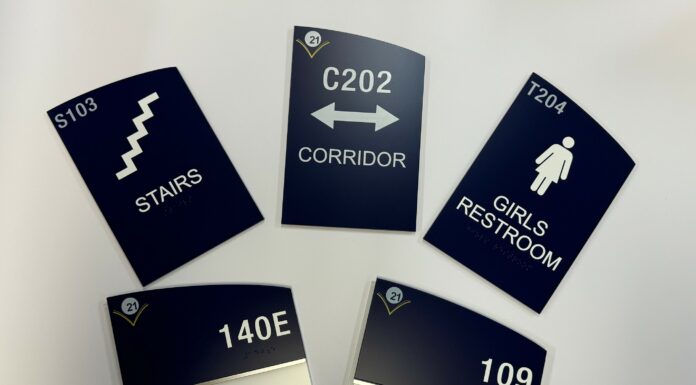This column was originally published in Sign Builder Illustrated‘s July 2024 edition.
A production meeting might seem like the last thing you have time for when you’re juggling a lot of work. But trust me, that hour of planning will put you in control of your workload, help boost team morale and positively impact your customer relationships.
Three Reasons Why Regular Meetings Help Your Team and Clients
1. Improved Communication
Regular production meetings keep everyone in the loop about project updates, deadlines and issues that come up. Sign shop owners can build trust and foster a sense of ownership within their team by communicating tasks effectively. This ultimately leads to your team having greater pride in both the projects they work on and the company overall.
David Underwood of Sarasota Sign Shop, a contributing member of the Behind the Signs Facebook community, responded to a recent question about production meetings in the group. He posted that his company has a total of eight employees, three of which are team leads. They huddle twice a week as a group for 30 minutes, and Underwood also holds condensed meetings with his shop and install lead. He commented that sometimes it’s hard stopping everything to hold meetings with that many people, but it’s a great way to keep everyone on the same page.
When I owned Sign Tech International, our lead project manager sent a daily “Happenings” report via email, which detailed tasks finished the previous day, currently in progress and scheduled for the next day. The report served as a prompt for necessary actions related to each task. Those tasks completed the previous day might require actions like arranging final permit inspections or sending completion photos and invoices. Tasks scheduled for the current day needed confirmation that everything was on track with no issues. Tasks scheduled for the next day might require contacting the client for access to a building or storefront. It all boiled down to effective production management and communication between our team and clients.
Impact on Team Relationships: Regular production meetings improve communication, problem-solving and teamwork, reducing misunderstandings and conflicts between team members. This creates a positive work environment where your team feels valued and respected, which builds stronger bonds.
Impact on Client Relationships: Clients receive better service when the team communicates well. Being informed about project details and timelines will help provide accurate updates, manage client expectations and address concerns promptly. This builds trust in the company’s ability to deliver quality signage solutions, leading to more work.
2. Efficient Resource Management
Production meetings allow you and your team to identify bottlenecks early on and work on solutions that minimize delays and maximize productivity.
For example, if the printer is busy with a big project for two days, consider outsourcing the work. This way, you can complete smaller projects on time and invoice the jobs more quickly, which helps cash flow and keeps your clients happy. Another example: If the paint department was backed up, it would help to hire a night-shift worker to prep the signs for the day-shift painters.
Regular meetings ensure you and your team can identify issues as they arise and work together to creatively manage resources in ways that preserve company profits and meet client expectations.
Amanda Yates, a sign shop production manager and Behind the Signs community member, has worked at two separate sign shops over the years: A smaller shop that had seven to eight team members, and a larger shop with 17 to 20 production team members.
The smaller shop had very short lead times with 40 to 50 orders on the floor at any given time. They held daily meetings lasting 15 to 20 minutes, focusing primarily on job due dates, and ensuring they had enough resources to get orders done on time.
The larger shop had up to 180 jobs moving through production at the same time. The timeline leads were a little more flexible, but the projects were a lot more complex. When Yates first started working at the larger shop, it was very disorganized, so it required meeting every day for 30 minutes using an online job board to track each task and stage of production. Once things were settled, they were able to meet just two to three times a week.
Yates found these meetings to be an absolute must. They were the best way to let everyone know who was responsible for each part of the project, and they ensured the team had the resources to get the jobs done on time. She recommends meeting every day until everyone is comfortable managing the shop’s resources. Regular production meetings helped Yates solve so many issues, and they will for your shop too. Meetings work!
Impact on Team Relationships: Managing resources well shows the company values its team’s time and skills. Efficient resource management supports employees, keeping them motivated and reducing burnout.
Impact on Client Relationships: Clients like getting their projects on time without delays. When resources are used efficiently, projects stay on schedule, making clients happy and loyal. They’re more likely to come back and recommend the company to others because of their good experience.
3. Increased Quality Control
Regular production meetings provide an opportunity to review project details, identify any differences between sign designs and determine what is actually being fabricated in the shop. It goes without saying that catching mistakes in the shop is much easier to fix than in the field.
If you consistently address quality control issues with your sign projects, over time you will make fewer and fewer mistakes, and you and your team will be known for making great signs.
At Sign Tech International, we often walked the floor following production meetings to ensure what was being fabricated was exactly what the client ordered. On larger projects, team members were required to sign off on a job before it left for install to ensure the details were correct. Regular production meetings ensured that mistakes rarely happened in the final stages of production.
Impact on Team Relationships: Focusing on quality control shows your team the company is dedicated to doing great work. Your team will feel proud knowing they help maintain high standards, making them feel more satisfied in their roles.
Impact on Client Relationships: When you always provide great signs, clients trust you more. When they get what they expect or even better, they see you as a dependable partner for their signage needs. This makes them want to come back to you again and refer your shop to others.
You might be wondering, how do we start and what tools can we use? Well, it begins with understanding a couple of important things about project management. First off, it’s important to know the difference between a production stage and a team task.

A production stage is where a job is in the process from start to finish. In our shop, we had five main production stages:
Stage 1: Open Job/Opportunity:
At this stage, a potential client asks for a quote. It’s the beginning of the project, where we figure out what the client needs and the best solution. This might involve checking with the landlord or city if it’s for an exterior sign to make sure the job is allowed.
Stage 2: Pre-Production:
This stage is when you’ve got the green light to start the project. It involves designing, researching codes and permits if necessary, making production files, and ordering materials.
Stage 3: Production:
This is when you make the signs and get ready to install them.
Stage 4: Install/Delivery:
At this stage, you’re either putting up the sign at the job location or getting it ready for delivery to the client.
Stage 5: Close-out:
At this stage, you make sure the client received the sign and is satisfied with it. It’s also when you get the final payment and wrap up the project.
Each production stage has a set of tasks for the team, often managed through an app. This helps your team know what they need to do each day.
There are specialized tools for the sign industry that can assist in managing production meetings, production stages and team tasks. I suggest researching to find the best fit for your team. SignTracker is an excellent option for sign shops, while Printavo is great for print and garment shops. These apps also offer quoting and file management features. If you only need a job board, there are other apps that can suit your needs.
Handling a heavy workload can be overwhelming, but I assure you, with regular project management meetings and the right tools, you’ll regain control of your work. This leads to happy clients and a team proud of their accomplishments.
Joe Arenella: A sign shop owner turned software founder! With SignTracker (an Inktavo company), he’s offering job tracking and sign quoting solutions for sign shop owners everywhere. Catch him on the Behind the Signs Facebook Community for industry tips and free resources, as well Behind the Signs Podcast, which he co-hosts with his daughter Liz Arenella Toynes, Co-Owner of Studio Dzo.










